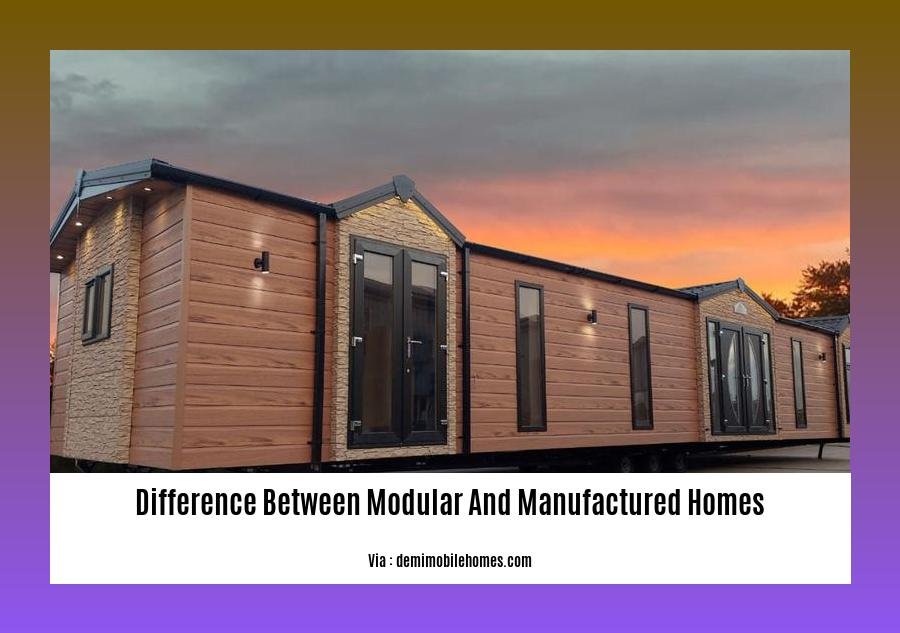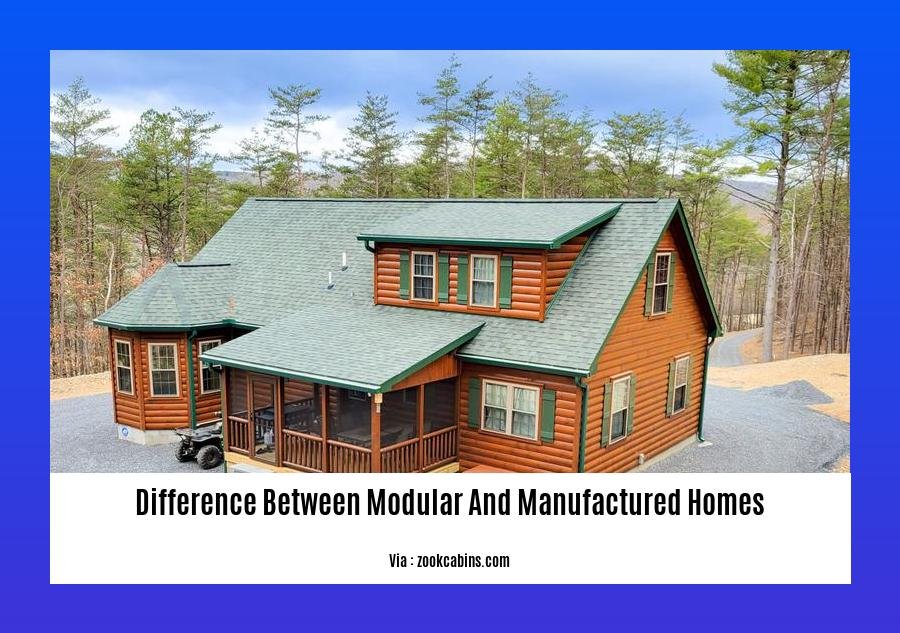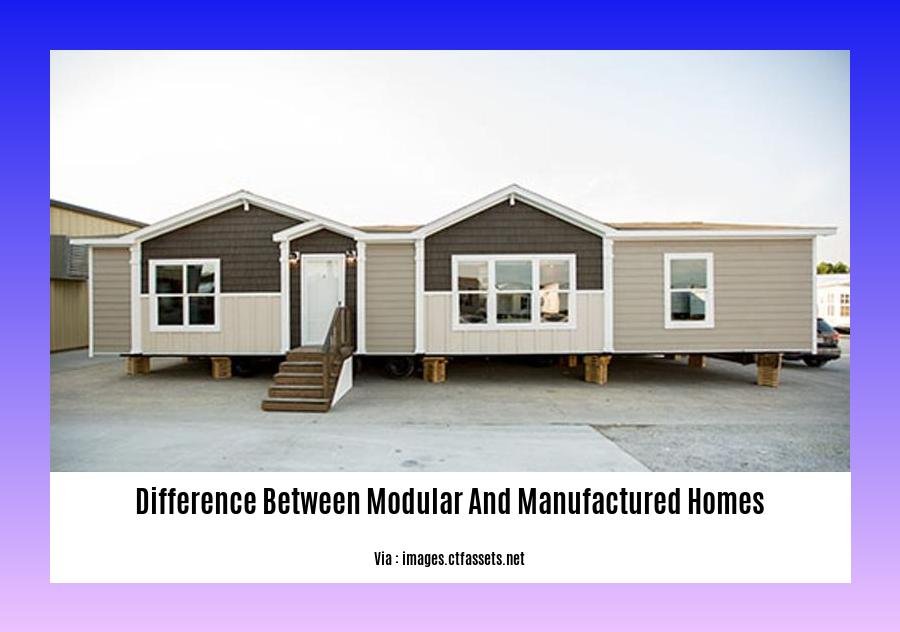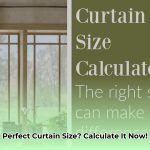In the realm of homeownership, navigating the choices between different housing options can be daunting. [- Unveiling the Difference between Modular and Manufactured Homes: A Comprehensive Guide for Informed Buyers] presents a detailed exploration of these two distinct types of homes, guiding readers through their unique characteristics, construction methods, and suitability for various preferences and budgets. With a balanced comparison, this guide empowers individuals to make informed decisions that align with their housing aspirations.
Key Takeaways:
-
Manufactured homes are built entirely in a factory and transported to their final location, while modular homes are constructed in sections off-site and then assembled on-site.
-
Modular homes are placed on a permanent foundation and must comply with local municipalities, while manufactured homes can be uprooted and moved again.
-
Manufactured homes are typically referred to as mobile homes, but the terms are a little outdated.
-
Manufactured homes are built in accordance with building codes set forth by HUD.
-
Getting a loan for a manufactured home can be more challenging as not all lenders offer financing or mortgages.
-
Generally, the value of a manufactured home will depreciate more quickly, while the value of a modular home follows the housing market.
-
Modular homes are more customizable than manufactured homes.
Difference Between Modular and Manufactured Homes:

Introduction:
In the quest for affordable and customizable housing options, modular and manufactured homes have emerged as popular alternatives to traditional brick-and-mortar constructions. While often used interchangeably, these two types of homes exhibit distinct differences in their construction methods, regulations, and overall value. This comprehensive guide delves into the nuances of each, empowering you to make informed decisions based on your unique needs and preferences.
Modular Homes:
-
Factory-Built, On-Site Assembled: Constructed in sections within a controlled factory environment, modular homes are transported to their final location and assembled by skilled professionals.
-
Permanent Foundation: Secured to a permanent foundation, modular homes are treated as real property, enjoying the same financing options as traditional site-built homes.
-
Robust Construction: Built to meet local building codes, modular homes offer equivalent durability and longevity compared to site-built homes.
-
Design Flexibility: Modular homes provide ample opportunities for customization, allowing you to select from a range of floor plans, finishes, and features to create a home that truly reflects your style.
Manufactured Homes:
-
Built Entirely in a Factory: Manufactured homes, also referred to as mobile homes, are entirely constructed within a factory, including plumbing, electrical, and HVAC systems.
-
Easily Relocatable: Manufactured homes are designed for mobility, allowing them to be uprooted and moved to a new location.
-
HUD Building Codes: Adhering to federal building codes set forth by the U.S. Department of Housing and Urban Development (HUD), manufactured homes must meet specific safety and construction standards.
-
Limited Financing Options: Securing financing for a manufactured home can be challenging as some lenders may consider them higher risk investments.
-
Depreciation and Value: Manufactured homes tend to depreciate in value over time, unlike modular homes, which appreciate similarly to site-built homes.
Choosing the Right Home for You:
The decision between a modular and manufactured home hinges on various factors, including your budget, lifestyle, and long-term goals.
Budget-Conscious:
- Manufactured Homes: Typically more affordable than modular homes, manufactured homes offer a cost-effective option for budget-minded buyers.
Customization and Design Flexibility:
- Modular Homes: With greater design flexibility, modular homes allow you to customize floor plans, finishes, and features to suit your unique preferences.
Durability and Longevity:
- Modular Homes: Built to local building codes, modular homes provide comparable durability and longevity to site-built homes.
Financing and Value:
- Modular Homes: Financing options for modular homes are generally more accessible, and their value appreciates over time, similar to site-built homes.
Mobility and Relocation:
- Manufactured Homes: Manufactured homes offer the advantage of mobility, allowing for easy relocation to a different location if desired.
Conclusion:
Modular and manufactured homes cater to diverse housing needs and preferences. While modular homes provide greater customization, durability, and value appreciation, manufactured homes offer an affordable and mobile alternative.
Ultimately, the choice depends on your budget, lifestyle, and long-term objectives. By carefully considering the factors outlined in this guide, you can make an informed decision that aligns with your unique requirements.
-
Searching for reliable dealers for mobile homes? Explore our extensive listings and find reputable sellers near you.
-
Deciding between modular and mobile homes? Uncover the difference between modular and mobile homes and make an informed choice tailored to your lifestyle and budget.
-
Enhance your home security with our comprehensive guide to different types of home security systems. Choose the optimal solution to safeguard your property and loved ones.
-
Weighing the pros and cons of home delivery? Discover the disadvantages of home delivery to make an informed decision about this increasingly popular service.
Design and Customization: Compare the design flexibility, customization options, and architectural features available in modular and manufactured homes.

Some prefer moving into a home straight from the factory, while others prefer the traditional on-site construction process. Both modular and manufactured homes have their own unique set of features, but they each offer advantages in terms of design, customization, and architectural features.
Customization Options:
Modular homes offer a higher degree of design flexibility and customization options than manufactured homes. Buyers can choose from a variety of floor plans, finishes, and features to create a home that meets their specific needs and preferences. Modular homes can also be customized to meet specific site conditions, such as a sloping lot or a narrow street.
Manufactured homes, on the other hand, are typically more limited in terms of customization options. Buyers can usually choose from a set number of floor plans and finishes, and they may have less flexibility to make changes to the home’s design. However, some manufacturers do offer some customization options, such as the ability to add a sunroom or a garage.
Architectural Features:
Modular homes and manufactured homes can both incorporate a variety of architectural features, such as vaulted ceilings, bay windows, and fireplaces. However, modular homes typically offer more flexibility in terms of architectural design. This is because modular homes are built in sections in a factory, which allows for greater precision and control over the construction process.
Manufactured homes are built entirely in a factory, which means that they are subject to the same design and construction limitations as other types of factory-built homes. This can make it more difficult to incorporate certain architectural features into a manufactured home.
Key Takeaways:
- Modular homes are built in sections in a factory and assembled on-site, while manufactured homes are entirely built in a factory.
- Modular homes offer greater design flexibility and customization options than manufactured homes.
- Modular homes can be customized to meet specific site conditions, while manufactured homes are typically more limited in this regard.
- Both modular and manufactured homes can incorporate a variety of architectural features, but modular homes typically offer more flexibility in terms of architectural design.
- Modular homes are generally considered to be more durable and energy-efficient than manufactured homes.
- Manufactured homes are more affordable and have a shorter construction time than modular homes.
Citations:
Mass Customization of Housing: A State-of-the-Art Review
Variability and Validity: Flexibility of a Dimensional Customization System for Façades
Cost and Financing: Analyze the cost differences between modular and manufactured homes, discussing the factors that influence the pricing and the financing options available.
When deciding between a modular or manufactured home, understanding the cost differences and financing options available plays a crucial role. Let’s dive into the factors affecting pricing and financing for both types of homes.
Key Takeaways:
- Affordability: Manufactured homes often carry a lower price tag compared to modular homes, making them more budget-friendly.
- Construction time: Modular homes may take longer to construct due to the assembly process, potentially influencing the overall cost.
- Customization: Modular homes offer greater flexibility for customization, which can impact the final cost based on personal preferences and desired features.
- Financing options: Both modular and manufactured homes can be financed through traditional mortgage loans, but manufactured homes may face stricter lending requirements.
- Resale value: Modular homes typically hold a higher resale value compared to manufactured homes due to their perceived quality and construction standards.
Factors Influencing Pricing:
-
Base Price:
-
Modular homes: Base prices vary depending on the size, design, and features included.
-
Manufactured homes: Typically have lower base prices due to standardized designs and mass production.
-
Customization:
-
Modular homes: Customizations such as unique floor plans and finishes can increase the cost significantly.
-Manufactured homes: Limited customization options may keep costs lower. -
Transportation Costs:
-
Modular homes: Transportation costs depend on the distance between the factory and the building site.
-Manufactured homes: Often transported in one piece, potentially incurring lower transportation costs. -
Site Preparation:
-
Modular homes: May require extensive site preparation, including foundation work and utility connections.
-Manufactured homes: Often have simpler site preparation needs due to their mobility.
Financing Options:
-
Traditional Mortgage Loans:
-
Both modular and manufactured homes can be financed using traditional mortgage loans.
-
Lenders may require a larger down payment for manufactured homes due to their lower resale value.
-
Construction Loans:
-
Modular homes may qualify for construction loans, especially if they are being built on a permanent foundation.
Making an Informed Decision:
When deciding between a modular or manufactured home, carefully consider your budget, desired features, and long-term goals. Modular homes offer customization and perceived higher quality, while manufactured homes are more affordable and easier to relocate. Weighing the cost differences and financing options will help you make an informed choice that aligns with your unique needs and preferences.
Citations:
- Manufactured Homes vs. Modular Homes: What’s the Difference?
- Financing a Manufactured Home: All You Need to Know
Legal and Regulatory Aspects: Discuss the legal and regulatory considerations related to modular and manufactured homes, including zoning regulations, building codes, and permits.
Navigating the legal and regulatory landscape of modular and manufactured homes can be a complex task. These structures are subject to various laws and regulations that govern their construction, placement, and use. Understanding these requirements is crucial for a smooth and compliant home-buying process.
Key Takeaways:
- Zoning Regulations:
- Both modular and manufactured homes must adhere to local zoning regulations, which determine the permissible use of land and property.
- Zoning laws may restrict the placement of these homes in certain areas or impose specific requirements for their design and appearance.
- Building Codes:
- These regulations ensure the safety and structural integrity of modular and manufactured homes.
- Building codes address various aspects, including materials, construction methods, fire safety, and energy efficiency.
- Compliance with building codes is mandatory and often enforced by local authorities.
- Permits:
- Before installing a modular or manufactured home, you must obtain the necessary permits from the local building department.
- These permits authorize the placement and construction of the home on your property.
- Failure to secure the appropriate permits can result in legal consequences and delays in the installation process.
Legal and Regulatory Considerations:
1. Zoning Regulations:
– Research local zoning laws to determine if modular or manufactured homes are permitted in your desired location.
– Be aware of any restrictions or requirements regarding the size, design, and placement of these homes.
2. Building Codes:
– Familiarize yourself with the building codes applicable to modular and manufactured homes in your area.
– Ensure that the home you’re considering meets or exceeds these standards for safety and quality.
– Hire qualified contractors who are knowledgeable about the building codes and can ensure compliance.
3. Permits:
– Obtain the necessary permits from the local building department before installing a modular or manufactured home.
– Submit detailed plans and specifications to the building department for review and approval.
– Pay the required fees and comply with any conditions attached to the permits.
4. Inspections:
– Modular and manufactured homes are typically subject to inspections by local building officials.
– These inspections verify compliance with building codes and zoning regulations.
– Be prepared for inspections and address any issues identified by the inspectors promptly.
5. Warranties:
– Modular and manufactured homes often come with warranties that cover defects in materials and workmanship.
– Understand the terms and conditions of the warranty and ensure that it meets your needs.
– Keep accurate records of all warranty-related correspondence and documentation.
Conclusion:
Navigating the legal and regulatory aspects of modular and manufactured homes is crucial to ensure a smooth and compliant home-buying process. By researching zoning regulations, building codes, permits, inspections, and warranties, you can make informed decisions and avoid potential legal issues. Consulting with local authorities, qualified contractors, and real estate professionals can also provide valuable insights and guidance.
Sources
- Legal Considerations for Modular and Manufactured Homes
- Manufactured Homes: Legal and Regulatory Considerations
FAQ
Q1: What is the key difference between modular and manufactured homes?
A1: The primary distinction lies in their construction method. Modular homes are built in sections in a factory and assembled on-site, while manufactured homes are entirely constructed in a factory and transported to the site in one piece.
Q2: Which housing option offers more customization flexibility?
A2: Modular homes generally allow for a higher level of customization compared to manufactured homes. Buyers can choose from various design options, layouts, and features to create a home tailored to their specific needs and preferences.
Q3: How do modular and manufactured homes compare in terms of building standards?
A3: Modular homes are built to the same standards as traditional site-built homes, adhering to local building codes and regulations. Manufactured homes, on the other hand, are constructed according to a federal code set by the Department of Housing and Urban Development (HUD).
Q4: Is there a significant difference in the cost between modular and manufactured homes?
A4: Typically, modular homes tend to be more expensive than manufactured homes. This is attributed to the higher level of customization, use of higher-quality materials, and adherence to stricter building standards associated with modular homes.
Q5: What financing options are available for modular and manufactured homes?
A5: Both modular and manufactured homes can be financed using traditional mortgages. Additionally, construction loans may be available for modular homes, providing buyers with more flexibility in financing their home purchase.
- Does 100% Polyester Shrink? A Complete Guide to Washing & Drying - April 16, 2025
- Elegant Drapery Solutions for Arched Windows: A Complete Guide - April 16, 2025
- The Best Dining Room Tables with Drop Leaves: A Buyer’s Guide - April 16, 2025










